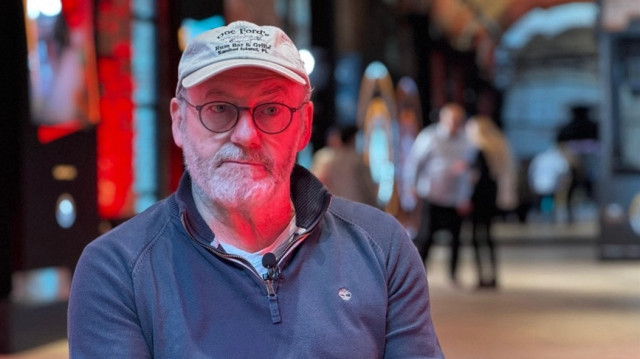
'It's sad, in a way, that we have to show documentaries to prove that we're all the same,' says Liam Cunningham
Irish actor Liam Cunningham, widely recognized for his role in Game of Thrones, has emerged as a vocal advocate for justice in Gaza.
In an exclusive interview with Anadolu at the 15th TRT International Documentary Awards, Cunningham passionately discussed his commitment to speaking out against injustice, drawing on personal experiences and Ireland's own history under British rule.
"I think it's one of those things -- I've never been a fan of injustice," he said.
Recalling his working-class upbringing, he explained how witnessing his father's mistreatment by employers shaped his moral compass.
"I made a promise to myself that whenever I saw it, I would speak up," he said.
His platform as a globally recognized actor has given him a louder voice, one he feels morally obligated to use.
"I could have a very easy life and just enjoy being a reasonably successful actor, but my conscience wouldn't allow me. I have to speak up," he emphasized.
For Cunningham, the sight of the powerful exploiting the vulnerable is intolerable, and he reserves equal disdain for those who remain silent.
- Ireland's history and empathy for Gaza
Cunningham firmly believes that Ireland's long struggle under British rule has shaped the Irish people's deep empathy for Gaza.
"We are a perfect example of what occupation can do," he said, referencing the devastating Great Hunger of the 19th century, during which Ireland lost millions to starvation and forced migration.
"That was under the control of the British government, and that wasn't even just in Ireland," he added, pointing to similar atrocities, such as the Bengal famine under Winston Churchill.
"That's why occupation makes me nauseous, because it involves apartheid, it involves crimes against humanity, and, as we're seeing at the moment, involves genocide," he stated unequivocally.
- On speaking out and the cost of activism
Asked about the backlash many celebrities face for supporting Palestine, Cunningham remained steadfast.
"What can they possibly do? Deny me one more opportunity to play dress-up, which is what I do for a living?" he said.
"We play dress-up. We tell stories. So what are they going to do? Shoot me in the street for speaking up? They don't have any power. The only power they have is the power we give them."
Cunningham criticized those who remain silent out of fear.
"I'm more concerned about the cowards who don't speak up, the people who look at the television go, ‘Isn't that awful? Let's put on a cookery program.' They're the people I find disappointing."
- The role of storytelling in highlighting injustice
For Cunningham, storytelling -- whether through film, theater, or television -- is a powerful tool for exposing injustice.
"It's sad, in a way, that we have to show documentaries to prove that we're all the same," he said.
"The people in Gaza, they are us. Everywhere I go, I feel incredibly comfortable because I'm shown kindness and welcomed. The vast majority of people are the same: looking for education, love, work and family."
He drew parallels between his work in Game of Thrones and the real-world struggle for justice.
"Game of Thrones was about the nature of power and the corrupting qualities that power can give you. You have to be very, very careful with power," he warned.
Drama, he noted, holds a mirror to society, while documentaries "open the window on the world."
Highlighting the enduring power of storytelling, Cunningham praised the works of poets and philosophers like Rumi, whose words have outlasted empires.
"It's words and stories that give a nation immortality, and that's why culture and art are precious to us as a species."
- Critique of the media and call for action
Cunningham did not hold back in his criticism of mainstream media, which he accused of abdicating its responsibility to hold power to account.
"It shouldn't be actors or comedians doing this. It should be the media, and they're not doing their job. They should be ashamed of themselves," he said.
His frustration was palpable as he described a media landscape controlled by the powerful.
"The rich who have bought the press are telling them what stories to put out. I just wonder where the backbone of news media has gone."
Ending on a plea for collective action, Cunningham urged people to speak up.
"If you haven't spoken up already, please, please speak up. This killing has got to stop. As I said before, if I we've been calling for a cease-fire for so long, and now it's got to the stage where, if I say, ‘Please cease-fire,' now you can turn around and go ‘Which one would you like to start with? Lebanon, Syria or Gaza?'
“It was just Gaza for a while, and now it's expanded, and it's going to get worse before it gets better if people don't stand up and say enough is enough."

